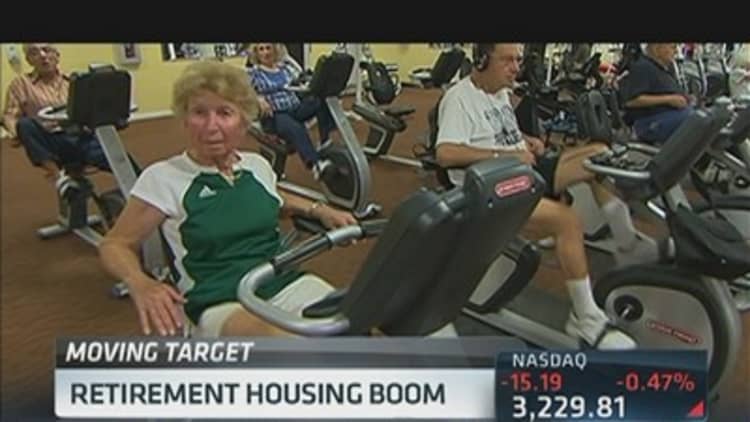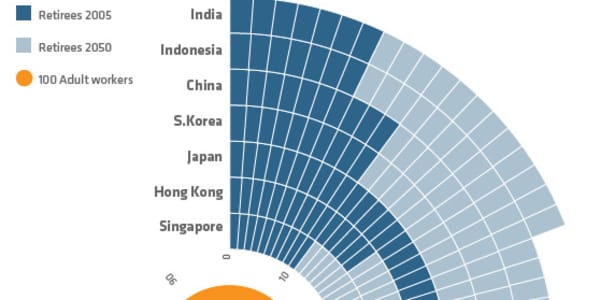British retirees Les and Sally Page had never considered retiring early in Asia, until a holiday to Thailand five years ago prompted a snap decision.
"We were on holiday on the island of Koh Samui and within five days we both knew we wanted to retire there," said 59-year old Sally. "It has a magical feeling that can't be explained."
The appeal of retirement in Thailand extends beyond the idyllic beaches of the island. The British couple said the Southeast Asian country boasts better weather, a greater variety of activities, a slower, easier pace of life and cheaper cost of living than what they are used to.
The Pages are just one couple in a burgeoning group of western retirees who have decided to spend their golden years in Asia.

Immigration figures show that British, American and German retirees made over 35,000 applications for retirement visas in Thailand in 2011 and is forecast to grow to 45,000 by the end of 2013, according to Sasha Nugent, analyst at U.K. based foreign exchange Caxton FX.
Nugent is seeing more and more U.K.-based retirees moving to Asia. "The most popular countries appear to be in South East Asia, in particular Thailand and Singapore," she said.
(Read more: Retirement villages – No longer a taboo in Asia)
Mea Attwood, a 58-year old British retiree who moved to Thailand five years ago, said cheaper living costs in comparison to the U.K. have allowed her to live a more luxurious and healthier lifestyle than she would at home.
"We are able to look after ourselves better in Asia. We can afford regular massages, for example, something that would be a real treat in the U.K.," said Mea.
"Plus there is no council tax in Thailand, and water and electricity is cheaper," she added.
Interestingly, Caxton FX's Nugent said Singapore still manages to lure a large number of expat retirees, despite the fact that living costs, particularly the cost of renting or buying property, are relatively high in comparison with the rest of Asia or the United Kingdom.
"Although generally, [Singapore] is just as pricey as the U.K. in terms of living expenses, there is good and low cost travel, not forgetting the cultural benefits," she said, adding that the city state is also viewed positively because of its financial stability and good banking system.
(Read more: The aging in Asia face a new decade like no other)

Now, the downside
But the comforts of the orient do come with their share of disadvantages. Quality health care in Southeast Asia, for example, can be expensive especially in the case of treating long-term illnesses.
"Health insurance is not really affordable once you get to 70 and medical bills are very expensive," Les and Sally said.
"It's reasonably cheap to visit the doctor or the hospital, but in the case of a serious illness, then we would have to consider whether we could afford ongoing treatment," added Mea.
(Watch now: The Future of Health Care in Asia)
Imported products in local supermarkets can also be pricier. 62-year-old British retiree John Harvey, who chose to retire in Malaysia four years ago, said alcohol is "disproportionately expensive," adding that this was not something he begrudged and fully accepted as part of living in a different culture.
He also cited the higher levels of crime in the region, which played a key role in his choice of retirement destination. John ruled out the Philippines from his shortlist of five countries due to safety concerns, ultimately settling on Malaysia, although he noted that reports of crime in the country have risen recently.
"If you read the press there is an increasing number of incidences of crime… I don't feel threatened but I've always adopted the policy of not drawing attention to yourself and not going to areas that are regarded as unsafe," John said.
(Read more: Chance of default for Malaysia minimal: Prime Minister)
For Les and Sally, road safety is among their biggest worries living in Thailand. "The driving is dreadful and it's a risk you take every day you go out," said the British couple. "Many people drink and drive, there are rarely any police unless you do have an accident," they added.
Still, for the Pages, the benefits far outweigh these concerns.
In Ko Samui, they live comfortably in a three-bedroom villa with a swimming pool and eat out several times a week, paying £1,500 ($2,358) a month for their total living costs, although Sally noted that they could easily live off around £100 pounds a week if they wanted to.
This compares with monthly living costs in the U.K. of around £2,000; and this amount doesn't include eating out as often or the cost of running a swimming pool.
For John, he still gets startled by the difference in living costs when he makes trips back home to the U.K.
"The prices shock me when I go back to England. The cost of doing anything [is higher]," he said.
—By CNBC's Katie Holliday: Follow her on Twitter @hollidaykatie





